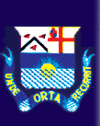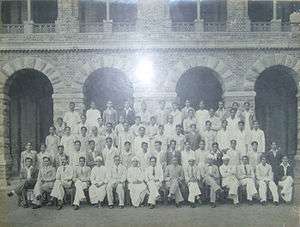Presidency College, Chennai
Coordinates: 13°03′36″N 80°16′56″E / 13.06007°N 80.28212°E
 | |
| Type | Government College |
|---|---|
| Established | 15 October 1840 |
| Location | Wallajah Road, Chepauk, Chennai, India |

Presidency College is an arts, law and science college in the city of Chennai in Tamil Nadu, India. Established as the Madras Preparatory School on October 15, 1840 and later, upgraded to a high school and then, graduate college, the Presidency College is one of the oldest government arts colleges in India. It is one of the two Presidency colleges established by the British in India, the other being the Presidency College, Kolkata.
History
At the behest of Sir Thomas Munro, a Committee of Public Instruction was formed in 1826. In 1836, the duties of the Committee were taken over by a "Committee of Native Education". The plans drawn up by the Committee did not commend themselves to the Governor of Madras, Lord Elphinstone, who in turn proposed nineteen resolutions which were passed unanimously.[1]
As first Principal, the choice of Elphinstone fell on E. B. Powell, a University of Cambridge Wrangler in Mathematics, who accepted the post. Powell reached Mumbai(Bombay) on 20 September 1840 but did not arrive at Chennai(Madras) until 24 November, the journey from Bombay to Madras taking some four weeks. In the mean time, the Committee had invited a Mr Cooper, from the Hoogly College, Kolkata(Calcutta), to carry out the duties of Principal temporarily, at a salary of Rs. 400 a month. Cooper accepted the invitation and came to Chennai(Madras). He and his staff opened Presidency School, a preparatory school, in a rented building in Egmore known as Edinburgh Home on 15 October 1840. Cooper remained in the preparatory school for only a few months. Soon after Eyre Burton Powell's arrival and before the opening of the High School department in April 1841, he returned to Kolkata(Calcutta). The preparatory School was shifted to Popham's Broadway in 1841.[1]
The schools grew into Presidency College. When the University of Madras was founded in 1857, Presidency College was affiliated to it.[1]
In 1870, the college moved to its present location in Kamaraj Salai, opposite Marina Beach.
Courses

Graduate courses
- Arts
- History [English and Tamil]
- Political Science [English and Tamil]
- Economics [English and Tamil]
- Economics [English and Tamil] (with vocational subject)
- English Literature [English]
- Tamil Literature [Tamil]
- Telugu Literature [Telugu]
- Hindi Literature [Hindi]
- Malayalam Literature [Malayalam]
- Urdu Literature [Urdu]
- Sciences
- Mathematics [English and Tamil]
- Statistics [English]
- Physics [English and Tamil]
- Physics [English and Tamil] (with vocational subject)
- Chemistry [English and Tamil]
- Botany [English and Tamil]
- Zoology [English and Tamil]
- Geology [English]
- Geography [English]
- Psychology [English]
- Commerce
- Corporate Secretaryship [English]
Post-graduate M.A., courses with research facilities for M.Phil., and Ph.D.,students
- Arts
History, Political Science, Public Administration, Economics, Tamil, Telugu, English and Sanskrit
- Sciences
Computer Science (MCA), Mathematics, Statistics, Physics, Chemistry, Botany, Zoology, Geology, Geography, Applied Microbiology and Psychology
- Philosophy
There are M.Phil courses in English, History, Political Science, Public Administration, Economics, Tamil, Telugu, Sanskrit, Mathematics Chemistry, Botany, Zoology, Geography and Commerce.
Doctorate courses
Facilities for research leading to the Ph.D. degree are available in the Mathematics, Statistics, Physics, Chemistry, Botany, Zoology, Geology, Geography, History, Political Science, Public Administration, Economics, Commerce, English, Tamil, Sanskrit and Telugu departments.

Notable alumni
- Subrahmanyan Chandrasekhar - Nobel laureate in Physics
- Bharat Ratna C. V. Raman, Nobel laureate in Physics
- Bharat Ratna C. Rajagopalachari, the last Governor-General of India
- Bharat Ratna C.Subramaniam - Minister, Finance Government of India
- K. M. Cariappa, first Commander-in-Chief of Defence Forces of independent India
- Benegal Rama Rau, Governor, Reserve Bank of India
- S. Jagannathan, Governor, Reserve Bank of India
- K. V. K. Sundaram, Chief Election Commissioner of India (1958–1967)
- P. Chidambaram, Finance Minister of India
- V Gopalsamy(Vaiko), Former MP, Founder of MDMK
- N. Ram, Managing Director and Editor in Chief, The Hindu
- G. N. Balasubramaniam, Carnatic vocalist
- V. S. Chandralekha, Politician and former IAS officer
- Paravastu Chinnayya Soori, Telugu scholar
- Sarvepalli Gopal, Chairman, National Book Trust and historian
- Nataraja Guru[2]
- C. P. Ramaswamy Iyer, Dewan of Travancore
- P. S. Sivaswami Iyer, Law Member of the Viceroy's Executive Council
- V. K. Krishna Menon (1896–1974), Defence Minister of India (1957–1962)
- C. R. Pattabhiraman, Minister, Law and Company Affairs, GOI
- Palani G. Periyasamy, businessman
- Ganapathi Thanikaimoni (1938-1986), Palynologist, Fyson Prize recipient, Research Director of Palynology Laboratory of the French Institute of Pondicherry
- Uma Sambanthan - social activist and wife of V. T. Sambanthan, one of the founding fathers of modern day Malaysia
- K. K. Srinivasan, officer and founder of a pre-school for hearing impaired children
- R. S. Subbalakshmi, educator and social reformer. (She was also the first Hindu woman graduate in the Madras Presidency)
- P. Subbarayan, Chief Minister of Madras
- K. Subrahmanyam, Secretary, Defence Production, Government of India
- Srinivasa Varadhan, Abel Prize laureate in Mathematics
References
- 1 2 3 The History of Presidency College at chennaionline.com
- ↑ Thadathil, George (2002). "The Making of a Tradition: The Vision of Nataraja Guru" (PDF). Divyadaan 13 (2): 159–190.
External links
| Wikimedia Commons has media related to Presidency College, Chennai. |
- Official website
- Information about establishment of Bioinformatics centres
- Article on Bioinformatics Centre at Presidency
| ||||||||||||||||||||||||||||||||||||||||||||||||||||||||||||||||||||||||||||||||||||||||||||||||||||||||||||||||||||||||||||||||||||||||||||||||||||||||||||||||||||||||||||||||||||||||||||||||||||||||||||||||||||||||||||||||||||||||||||||||||||||||||||||||||||||||||||||||||||||||||||||||||||||||||||